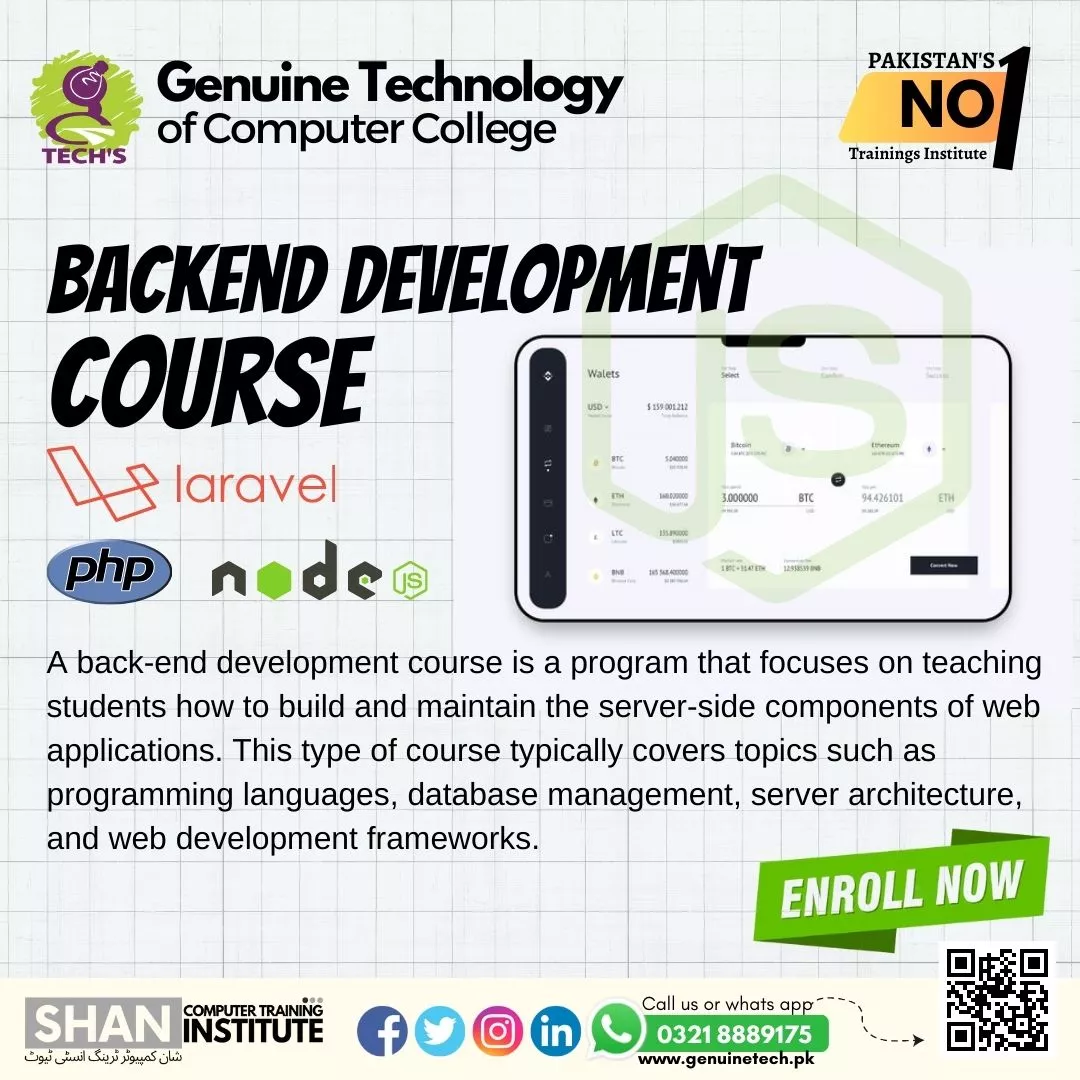The College > Blog > Learn Web Development with Online Courses and Programs
Learn Web Development with Online Courses and Programs
Which course is best for learning web development? web development short courses in lahore
Learn the best web development courses online with certificates in which you can learn the programming languages for creating website which may include HTML & CSS for creating web pages of website, JavaScript for modern design elements and Bootstrap for responsive of website and on the back-end development you can learn PHP with laravel framework, SQL, Python programming to enhance your coding skills like a professional this courses in web development you can gain the programming skills high in demand and as website developer full stack their is many career opportunities for you as well in the job market you just need to expertise your skills in;
- Basics of web development
- Front-end Technologies
- HTML, CSS & JavaScript for creating web pages
- PHP with Laravel Framework
- React with Laravel development
- Python Programming
- Back-end Development
- Content Writing
- Website Optimization
- Security and Maintenance
Upon the completion of this online course in website development you may learn a lot of things from basic to an advance level you can learn to build website from scratch using popular tools and languages so every candidate can enroll in this best web coding course you can design and develop web applications along with this you can learn content writing and seo optimization training as well to boost your website performance on search engines and drive traffic on your website. We may provide you training on each topic start from basic introduction to a pro level in this web developer program you can join any organization or can do freelancing as well for earning money online as a freelance web developer.
Which is best way to learn web development
The best way to learn web development is learning through real-world projects and tasks under the expertise of full stack developer website you can enhance your coding expertise and become a professional web design and web development developer.
Why Learn Web Development Online
These are the following reasons to learn web development online;
Flexibility and Convenience
Online courses for web development may provide you the ease of time like you may learn web development at any time at any place their is no need to travel to attend physical class or you are not bound to any time schedule so it may provide provide you flexibility and convenience for learning web development course online.
Access to Expert Instructions
This online website development training may provide by the industry experts so in this way you can create a network with them and know about the latest industry trends or work on web development industry projects in this way you can get hands-on guidance and practical tips which is essential for you as a web developer.
Cost-Effectiveness
Online web developer courses is affordable as compared to physical ones so by enrolling in online courses or programs you may save your money and enhance your skills so we can say online web development programs may cost effective as we can compare it with the physical ones.
What is a Front-End Developer?
A web developer who is reponsible for creating and design web applications using the front-end programming languages like HTML, CSS & JavaScript and their popular frameworks like React and many more. They can attract customer with their dynamic website design and as a front-end web developer their is many career opportunities for you to earn money online or physically in the job market the more experience you get the more money you can earn.

What is Back-end Development?
In web programming a back-end development is the process of creating server-side logics in which you can create database for web applications and manage website coding and functionality. As a back-end developer you are responsible for server-side programming, database management, authentication and security, API development, performance optimization, testing and debugging, deployment and devOps. You can earn a lot of money in this web developer career as a backend developer.

Latest Trends in Web Development Online Courses
Genuine Tech is offering the best web development online course for candidates who can not join us physically can enroll in this online web development training program and enhance their skills in this web development coding you can learn the latest trends in web development online by working on real-world projects and task provided by our web developer experts. You can learn to building real-world projects with GT online web development courses.
Our aim is to provide quality education to every candidate so they can use their skills in the prosperity and progress of our country Pakistan this course on web development is one of the high in demand and beneficial for candidates in IT field because it may unlock many career opportunities for the success in future you can easily earn up to 6 figure salary with this web development online training in Pakistan. Our you can work as a freelance web developer by providing your web services online.
Web Development Coding Challenges and Exercises Online
Once you learn this web development course you may do practice website development exercises to check your skill and it may increase your knowledge and experience or you may update with the latest trends of web developer as well for the job market before enrolling in online courses you need to choose the right online program for web development in which you can learn the tips and tricks for mastering web development as well by working on different projects and assignments.
Our goal is to provide quality education to every candidate so that they can use their skills to contribute to the prosperity and progress of our country, Pakistan. This web development course is in high demand and beneficial for candidates in the IT field because it can open up many career opportunities for success in the future. You can easily earn up to a six-figure salary with this web development online training in Pakistan. You may work as a freelance web developer and provide your web skills online.
Conclusion
In conclusion the online mentorship for web development is necessary for candidates to enhance their web developer skills you may learn the web coding languages and continue learning the latest trends as a web developer or can join online bootcamps for web development to gain knowledge or increase your expereince. The web development online courses by Genuine Tech may unlock the career opportunities in web development field. For advance learning you may enroll in laravel framework training to become a laravel developer if you want to master in one web language like Python, PHP along their frameworks you can join us and master web development skill.
From codingdojo.com you can get more detail about website design and development.







